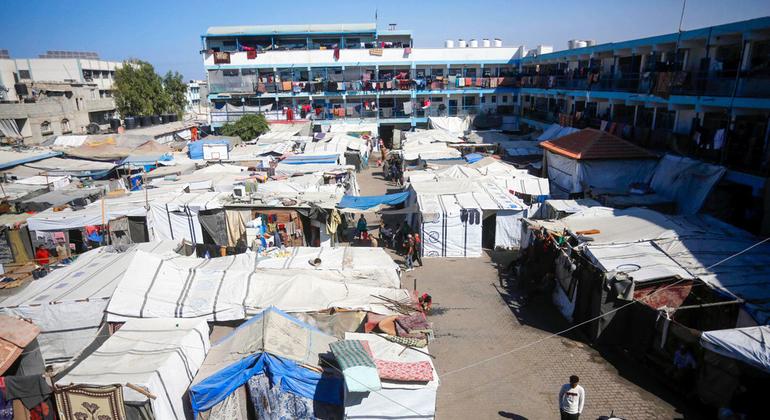UN Official Warns of Deteriorating Humanitarian Crisis in Gaza Amid Looming Famine
Reporting from central Gaza, Louise Wateridge, a senior emergency officer with the United Nations Relief and Works Agency for Palestine Refugees (UNRWA), sounded the alarm about the dire conditions in the Gaza Strip. As winter approaches, hundreds of thousands of people forcibly displaced by the ongoing conflict are living in makeshift shelters, sleeping on the floor amidst unsanitary conditions, including raw sewage.
“We are deeply concerned about what will happen to 500,000 people living in flood-prone areas as the rains begin,” Wateridge said during a press briefing in Geneva.
The humanitarian situation in Gaza is further exacerbated by critically low levels of aid entering the war-torn enclave. According to Ms. Wateridge, the volume of supplies has reached its lowest point in months, with just 37 trucks of aid entering Gaza daily in October—a fraction of what was permitted before the conflict. This amounts to merely six percent of the previous commercial and humanitarian supply levels for the 2.2 million residents.
—
US Aid Deadline Passes Without Progress
When asked about the U.S.-imposed deadline for Israel to improve Gaza’s aid conditions by November 12, Wateridge confirmed that the situation has only worsened. Aid deliveries have decreased despite international calls for increased access.
In northern Gaza, where the UN has been denied entry, the desperation is palpable. “People are begging for scraps of bread and water,” Wateridge revealed, adding that 80 percent of Gaza’s population—about 1.7 million people—did not receive food rations in October. The situation is so critical that last Friday, the UN-partnered Integrated Phase Classification (IPC) Famine Review Committee issued an urgent alert warning of imminent famine in northern Gaza.
As the suffering intensifies, Wateridge warned, “People are losing hope.” Despite planned humanitarian missions to northern Gaza this week, Wateridge and her colleagues were blocked from delivering supplies such as chlorine tablets or assessing shelter conditions. For over a month, no UNRWA staff has been able to access these besieged areas.
—
Hospitals on the Brink: “Every Hour Counts”
Wateridge described harrowing accounts from UN colleagues and medical workers in the north, painting a stark picture of the deteriorating situation. Hospitals have run out of blood supplies and essential medicines, while ambulances are no longer operational. Bodies lie in the streets as people resort to using donkey carts to reach medical facilities.
“Colleagues are trapped in residential buildings, unable to leave. The eight water wells in Jabalia managed by UNRWA have also stopped functioning, leaving residents without clean drinking water,” she said.
The situation is becoming increasingly urgent, with Wateridge stressing the necessity of gaining access to the besieged northern areas. “Every hour matters now,” she pleaded, reiterating UNRWA’s call to Israeli authorities for immediate entry to provide critical aid.
—
Ceasefire: The Only Path to Relief
The conflict’s broader consequences are also escalating. Late last month, the Israeli Parliament voted to ban UNRWA operations within the country, including prohibiting any contact with its officials. The legislation will take effect in 90 days, further complicating efforts to alleviate suffering in Gaza.
Addressing both sides of the conflict, Wateridge called for an immediate ceasefire. “Our message to Hamas and the Israeli forces is clear: there needs to be a ceasefire,” she said. While condemning the “horrific attacks” by Hamas on Israeli civilians on October 7, she emphasized that ongoing civilian suffering on both sides must stop.
“We’ve witnessed unimaginable suffering—Israeli civilians subjected to terror on October 7, followed by the devastating impact on civilians in Gaza. A ceasefire, the release and safe return of all hostages, and respite for all affected civilians in Gaza and the wider region are urgently needed,” she concluded.














Leave a Reply